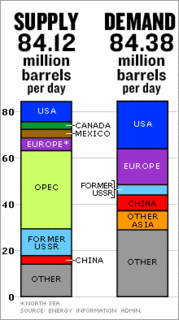Will Peak Oil be Ignored in a Crisis?
Oil set new record prices every day last week, in both London and New York. It has settled back a little today, but most analysts see it continuing to rally. Commentators have pointed to the resumption of nuclear processing in Iran and the consequent sabre rattling as a key driver of the price
While tensions over Iran are an obvious threat to a tight market for crude oil (their production represents about 5% of the world’s output) there is a lot more going on besides. A graph published by the IEA tells a story all of its own. As we can see, demand is represented as exceeding supply.

There is an argument going on at econbrowser (when is there not, one wonders) about whether it makes sense to talk about demand exceeding supply. If we assume that living standards are to be kept as they are at present (Thgat is to say, no restrictions on fuel use by imposition) then it is perfectly possible to talk about demand, or need, being in excess of supply.
It’s a bit like saying that in the desert your demand for water exceeds the supply. In both cases demand must be brought to meet supply: In the desert you will eventually die of thirst and supply will actually exceed demand; in the oil market economies will atrophy until an equilibria is met, at a certain price.
But the oil market is very prone to sudden increases in price. While it might seem reasonable to assume that the orderly rise of prices will slowly whittle away demand until they match, all the evidence suggests that we are much more likely to experience periodic crises that result in very large increases in price.
The current run up in price, I believe, heralds the arrival of peak oil. Known rates of depletion, expected decline and the details of future projects all tend to suggest that we may never produce more oil than we do this year.
This will be doubly true if we experience serious political disturbances in one of the large exporters. The risks continue multiplying; Iraq, Iran, Saudi Arabia, Nigeria, the Caspian Basin. All teeter precariously close to chaos.
Here in New Zealand the Ministry of Economic Development released a report today about how to conserve oil in a hurry. It followed on from a report issued by the IEA to member countries on the same subject last year. They were quick to point out that the recommendations were contingency plans and that they didn’t in fact see any looming crises. That’s like acknowledging there’s an elephant in the living room, but denying that he is about to wreck up the place!
In any case, when the public hear the words ‘petrol rationing’ and ‘carless days’ on the radio before breakfast it seems likely that many would think the possibility not at all comforting.
So while we are experiencing demand that is not in fact being met by supply, it will likely be a non-linear, politically precipitated incident that pushes the market to begin demand destruction in earnest.
I think there is a real risk in this for those of us that have and will continue to publicise the concepts behind peak oil.
In the midst of an oil crisis the factors that are going to concern people are not going to be geological realities. People and governments are going to be fixated on what they can do to restore oil supplies. An insistence that we need to face up to oil depletion is not going to go down well. Don’t preach to the addict who's short of his fix. No one will thank you for pointing out that oil was going to run out whatever we do.
And, moreover, we may in fact find that oil depletion follows a path of periodic economic crises punctuated by mild recoveries. It is during these recoveries that the peak oil community will need to steel its resolve.
Peak oil will be the most important point in the long run down the back slope of Hubbert's curve, but we need to be prepared for a bumpy ride, in every sense. An understanding of oil depletion is vital for individuals and groups wishing to navigate the future, but don’t be surprised if the message is lost in the noise.
Technorati Tags: Peak Oil Energy Decline





